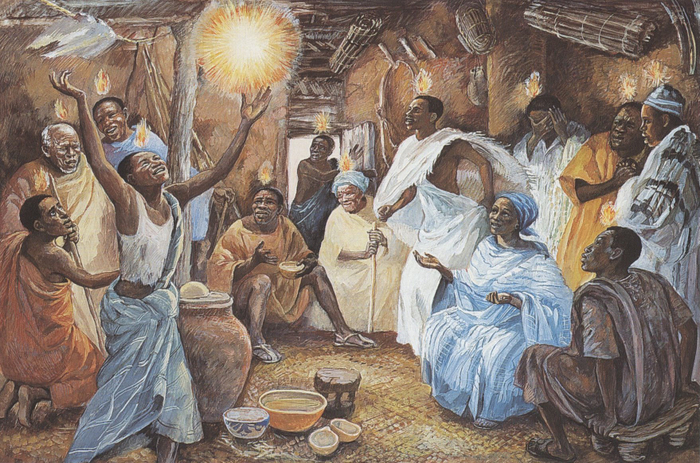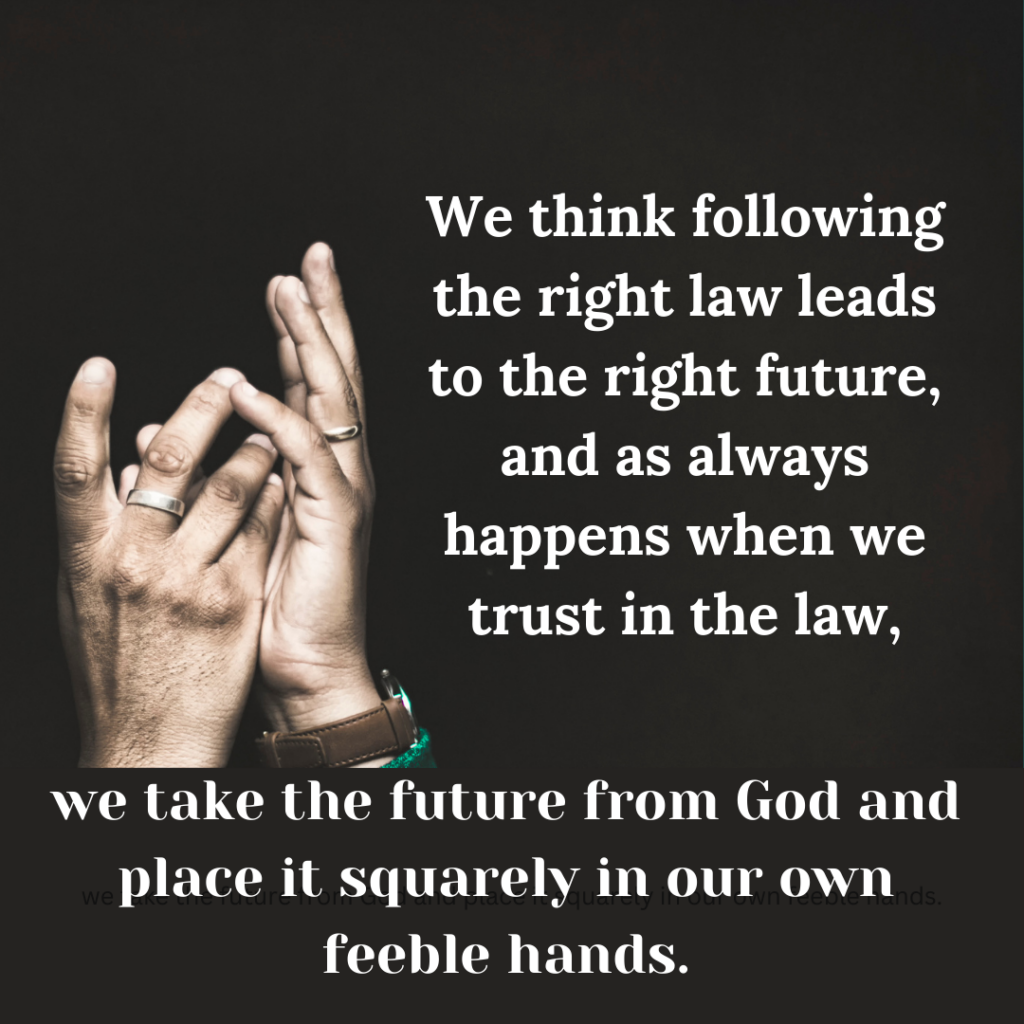The Unraveling
Acts 2: 1-21
Pentecost Sunday
Analysis by Matt Metevelis
When the day of Pentecost had come, they were all together in one place. And suddenly from heaven there came a sound like the rush of a violent wind, and it filled the entire house where they were sitting. Divided tongues, as of fire, appeared among them, and a tongue rested on each of them. All of them were filled with the Holy Spirit and began to speak in other languages, as the Spirit gave them ability.
Now there were devout Jews from every people under heaven living in Jerusalem. And at this sound the crowd gathered and was bewildered, because each one heard them speaking in the native language of each. Amazed and astonished, they asked, “Are not all these who are speaking Galileans? And how is it that we hear, each of us, in our own native language? Parthians, Medes, Elamites, and residents of Mesopotamia, Judea and Cappadocia, Pontus and Asia, Phrygia and Pamphylia, Egypt and the parts of Libya belonging to Cyrene, and visitors from Rome, both Jews and proselytes, Cretans and Arabs—in our own languages we hear them speaking about God’s deeds of power.” All were amazed and perplexed, saying to one another, “What does this mean?” But others sneered and said, “They are filled with new wine.”
But Peter, standing with the eleven, raised his voice and addressed them, “Fellow Jews and all who live in Jerusalem, let this be known to you, and listen to what I say. Indeed, these are not drunk, as you suppose, for it is only nine o’clock in the morning. No, this is what was spoken through the prophet Joel:
‘In the last days it will be, God declares,
that I will pour out my Spirit upon all flesh,
and your sons and your daughters shall prophesy,
and your young men shall see visions,
and your old men shall dream dreams.
Even upon my slaves, both men and women,
in those days I will pour out my Spirit,
and they shall prophesy.
And I will show portents in the heaven above
and signs on the earth below,
blood, and fire, and smoky mist.
The sun shall be turned to darkness
and the moon to blood,
before the coming of the Lord’s great and glorious day.
Then everyone who calls on the name of the Lord shall be saved.’

Pentecost – Jesus Mafa https://diglib.library.vanderbilt.edu/act-imagelink.pl?RC=48388
The job of the disciples was not to build the optimal pathway, but to simply build upon the places where the Spirit would walk ahead of them.
DIAGNOSIS: Turned in on Ourselves
Step 1: Initial Diagnosis (External Problem): Gathered in One Place
The disciples started the day of Pentecost in the first official church assembly. They probably didn’t have weak coffee or formal ministry reports. But they huddled together, discussing strategy, going over plans, sharing their distresses. What were they to do? What kind of movement were they leading? What would the future be? We don’t know if they gathered in fear, post-ascension confusion, or simply exhausted wonder at fellowship with the resurrected Jesus. Luke gives almost no details about this meeting other than the simple fact that the disciples had gathered in one place. The second chapter of Acts witnesses the disciples contradicting the promise of the first chapter. Instead of being the witnesses of Jesus in the world they are huddled in Jerusalem.
Step 2: Advanced Diagnosis (Internal Problem): Safety in Numbers
Other Israelites had come to Jerusalem on that very day. They came to celebrate the festival, offer their gifts, and reorient themselves as Israelites. The logic of their religion at the time held that sacrifices in one location, the temple on Mt. Zion, was the fabric that held their people together. Such centripetal devotion united people from diverse backgrounds. It created a distinct unity of faith even under the thumb of the imposed unity of power and imperial coercion by Caesar.
Our own time is much more fractured than the first century and lack of such unity is often lamented. Christianity is fractured into confessional divisions, nations are rent by political divisions both cultural and economic, and neighbors are torn by divergent traditions and moral beliefs. But we still long for a type of unity that can be provided by the victory of our group. Culture warriors on both sides trade in a type of pessimism that holds that their side must be under siege because their perspective isn’t dominant. We engage in group thinking and we nurse group grudges. We are tempted to keep company only with like-minded people. Like the disciples who began the day clustered together we long to be gathered in with people like us.
Step 3: Final Diagnosis (Eternal Problem): We Strategize
The question before every group is always survival. How will a movement survive? How will the group ensure that they will have the resources they will always need? Even people of faith entertain a kind of “functional” atheism that believes in God with the mind while the hearts and hands work furiously without hope. Such logic pervades the common phrase in church circles that we must “be church.” By turning the church into a verb, the advice is clear. God has laid down some kind of path for survival that we discern by doing holy things and having holy attitudes. Once we embody what God wants then God will give us the things that we want. We gather to learn from one another what these things might be, conform to them, and march into “God’s preferred future” with common purpose. We think following the right law leads to the right future, and as always happens when we trust in the law, we take the future from God and place it squarely in our own feeble hands.
PROGNOSIS: Turned toward the World
Step 4: Initial Prognosis (Eternal Solution): The Spirit Delivers the Gospel
As the disciples talked about the future and fussed over how to “be church,” the Spirit came in like a mighty wind. The Spirit comes disrupting plans, breaking into conversations, and driving people into places where they don’t want to go. What is most striking about the Pentecost story is that most of the narrative hinges on what the Spirit does and the reactions of the people who hear it. No detail is given about just how the disciples left the house or where they went when they did so. The Spirit comes, gives gifts, and the crowds now gather around them. All the motion in the story belongs to the Spirit. “Just as the spirit gave” becomes the focal point of the story, and the ignition of the church’s preaching of Christ crucified and risen. As Peter points out in the very beginning of his sermon, this is a promise made through the prophet Joel that the Spirit would be poured out on all flesh. The law impresses upon us the need to make plan, but the Spirit gives the gospel by activating within our ears and on our mouths the promises of God in Christ.
Step 5: Advanced Prognosis (Internal Solution): God Leads
There is a story about Dwight Eisenhower in between the war and his presidency while he served as the head of Columbia University. University officials disputed where to place a walkway as they sought to keep unwanted feet from trampling the grass. The argument got so heated that it finally bubbled up to Eisenhower’s office. His advice was to wait. Just wait and see where the feet actually go, and then build the walkway.
This might be a great way to summarize this story and the entire book of Acts. The job of the disciples was not to build the optimal pathway, but to simply build upon the places where the Spirit would walk ahead of them. As an Ethiopian eunuch puzzled over scripture, as Roman centurions welcomed the disciples, as one of the church’s greatest enemies became their greatest advocate, and as unwashed gentiles got baptized in droves, the book of Acts is the story of the disciples learning to stay out of the Spirit’s way as they are driven to the ends of the earth to preach the Word. The church is not some new trail we blaze, it’s the structure that we lovingly place around those places where Jesus walks ahead of us with good news to bless more and more people. It’s not the safety of the space we build but the wonder and freedom of the places that the good news will take us.
Step 6: Final Prognosis (External Solution): Sent throughout the World
This story begins with a gathering in but ends with an unraveling. The transformative preaching of Peter and the other disciples that will spin their little gathering apart and across the entire known world and through at least twenty more centuries. The church is less what believers build and more the grappling with the glorious mess that God’s mighty wind leaves after blowing down divisions and uprooting lives. Our meager plans are replaced with God’s mighty promises. Pentecost is the day when the gospel came to get to work, to accomplish through mere words what the most motivated movements could never dream of achieving. The law throws us upon ourselves, but the gospel launches us into the world.




You must be logged in to post a comment.